

2020.03.19.20039164v1. ASPHER statement on the novel coronavirus disease (COVID-19) outbreak emergency. With the outbreak of novel coronavirus disease 2019 (COVID-19) we are currently experiencing a worldwide emergency affecting all societies.
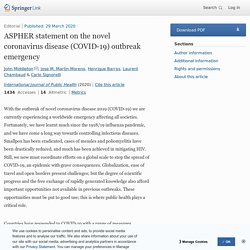
Fortunately, we have learnt much since the 1918/19 influenza pandemic, and we have come a long way towards controlling infectious diseases. Smallpox has been eradicated, cases of measles and poliomyelitis have been drastically reduced, and much has been achieved in mitigating HIV. Still, we now must coordinate efforts on a global scale to stop the spread of COVID-19, an epidemic with grave consequences. Globalization, ease of travel and open borders present challenges; but the degree of scientific progress and the free exchange of rapidly generated knowledge also afford important opportunities not available in previous outbreaks. These opportunities must be put to good use; this is where public health plays a critical role.
Author information Affiliations Corresponding author Correspondence to John Middleton. Additional information. Prevención del coronavirus: entrevista al Dr. Rafael Ortí (SEMPSPH) La pandemia de coronavirus que está afectando especialmente a España ha puesto en jaque al sistema sanitario, que se ha visto desbordado ante el incremento de pacientes infectados por SARS-CoV-2 que requieren asistencia médica.
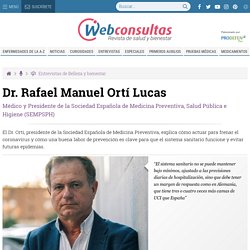
Y es que a pesar de que los expertos afirman que alrededor del 80% de las personas que se contagian con el virus solo desarrollará síntomas de COVID-19 leves, su elevada capacidad de transmisibilidad ha favorecido su rápida expansión y que muchas personas con factores de riesgo –avanzada edad o con patologías previas (enfermedades cardiovasculares o del aparato respiratorio, diabetes…)– hayan contraído COVID-19 y presenten síntomas graves. Hablamos con el Dr. ¿Deberían haberse tomado antes al ver lo que estaba sucediendo en Italia? El Gerente De Mediado: Lecciones desde Italia: mensaje en una botella que nadie escucha. “There is no such thing as society” Margaret Thatcher.
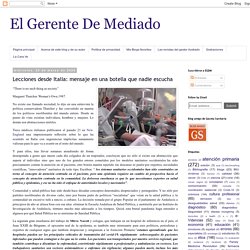
Woman’s Own.1987. No existe eso llamado sociedad; lo dijo en una entrevista la política conservadora Thatcher y fue convertido en mantra de los políticos neoliberales del mundo entero. Desde su punto de vista existían individuos, hombres y mujeres. Lo demás son abstracciones inútiles. Trece médicos italianos publicaron el pasado 21 en New England una impresionante reflexión sobre lo que ha ocurrido en Italia con sugerencias implícitas sumamente valiosas para lo que va a ocurrir en el resto del mundo. Comunidad y salud pública han sido desde hace décadas conceptos denostados, despreciados y perseguidos.
“Este desastre podría haberse evitado con un despliegue masivo de servicios ambulatorios. At the Epicenter of the Covid-19 Pandemic and Humanitarian Crises in Italy: Changing Perspectives on Preparation and Mitigation. We work at the Papa Giovanni XXIII Hospital in Bergamo, a brand-new state-of-the-art facility with 48 intensive-care beds.

Despite being a relatively small city, this is the epicenter of the Italian epidemic, listing 4,305 cases at this moment — more than Milan or anywhere else in the country (Figure 1). Lombardy is one of the richest and most densely populated regions in Europe and is now the most severely affected one. The World Health Organization (WHO) reported 74,346 laboratory-confirmed cases in Europe on March 18 — 35,713 of them in Italy. Our own hospital is highly contaminated, and we are far beyond the tipping point: 300 beds out of 900 are occupied by Covid-19 patients.
Fully 70% of ICU beds in our hospital are reserved for critically ill Covid-19 patients with a reasonable chance to survive. But the situation in the surrounding area is even worse. This disaster could be averted only by massive deployment of outreach services. Primum non nocere 2020. La ingesta de medicamentos (≥1) por parte de pacientes hipertensos para reducir la presión sanguínea a la hora de acostarse, en lugar de al despertar, da como resultado un mejor control de la PA y sobre todo una disminución notable de eventos cardiovasculares.
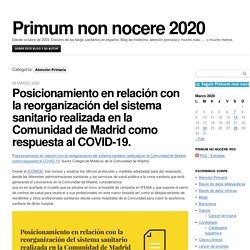
El tratamiento de la hipertensión a la hora de acostarse mejora la reducción del riesgo cardiovascular: el ensayo de cronoterapia Hygia Ramón C Hermida, Juan J Crespo, Manuel Domínguez-Sardiña, Alfonso Otero, Ana Moyá, María T Ríos, Elvira Sineiro, María C Castiñeira, Pedro A Callejas, Lorenzo Pousa, José L. How Will the Coronavirus End? Editor’s Note:The Atlantic is making vital coverage of the coronavirus available to all readers.
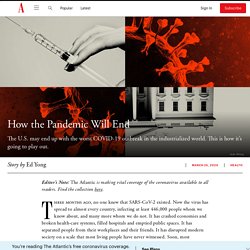
Find the collection here. Three months ago, no one knew that SARS-CoV-2 existed. Now the virus has spread to almost every country, infecting at least 446,000 people whom we know about, and many more whom we do not. It has crashed economies and broken health-care systems, filled hospitals and emptied public spaces. It has separated people from their workplaces and their friends. To hear more feature stories, get the Audm iPhone app. A global pandemic of this scale was inevitable. How Does the Coronavirus Behave Inside a Patient? In the third week of February, as the COVID-19 epidemic was still flaring in China, I arrived in Kolkata, India.
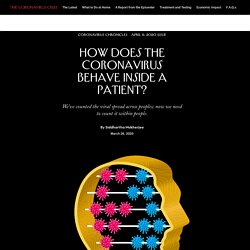
I woke up to a sweltering morning—the black kites outside my hotel room were circling upward, lifted by the warming currents of air—and I went to visit a shrine to the goddess Shitala. Her name means “the cool one”; as the myth has it, she arose from the cold ashes of a sacrificial fire. The heat that she is supposed to diffuse is not just the fury of summer that hits the city in mid-June but also the inner heat of inflammation. She is meant to protect children from smallpox, heal the pain of those who contract it, and dampen the fury of a pox epidemic. The shrine was a small structure within a temple a few blocks from Kolkata Medical College. The Indian practitioners of tika had likely learned it from Arabic physicians, who had learned it from the Chinese.